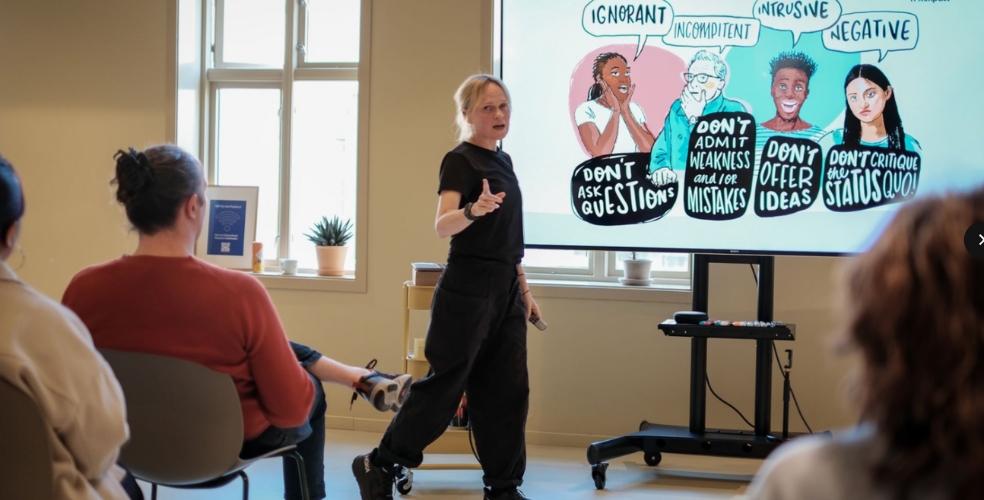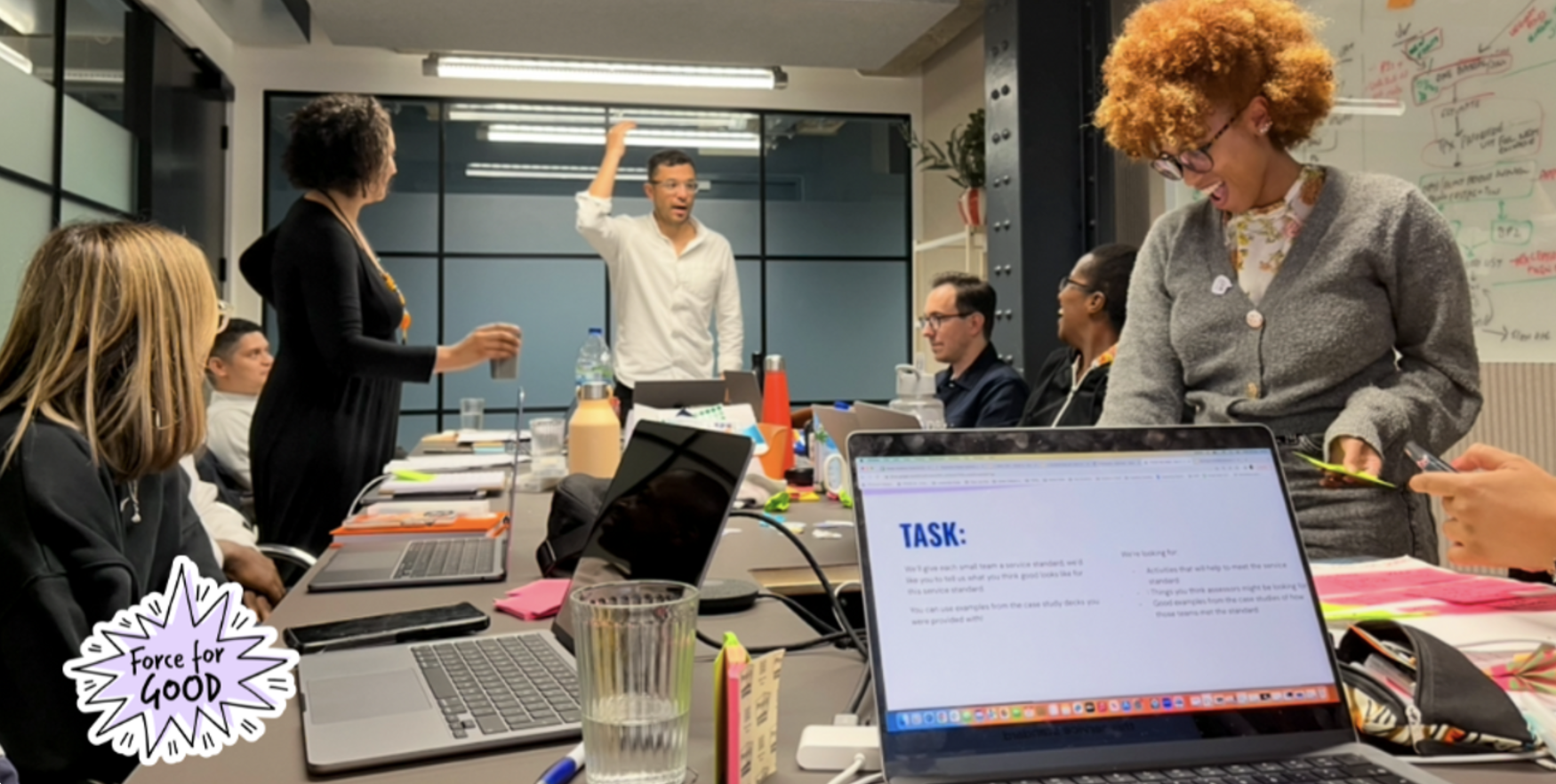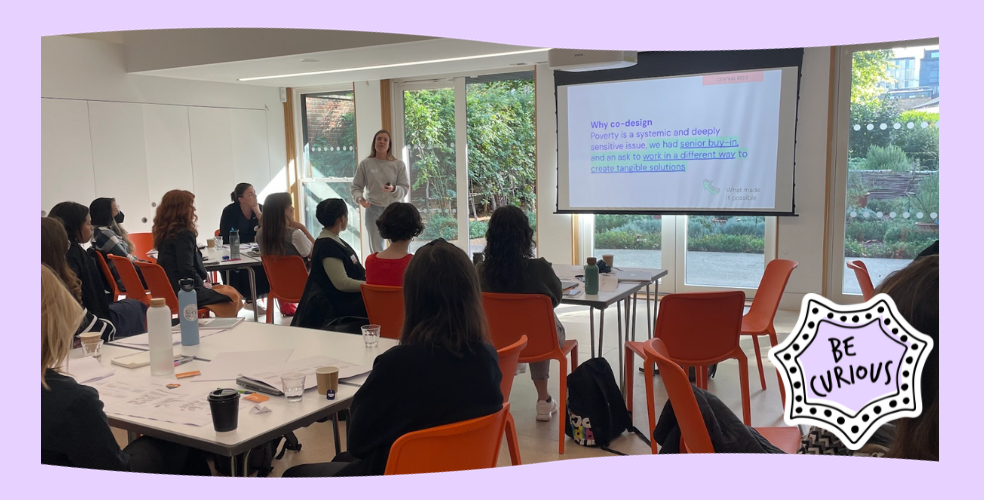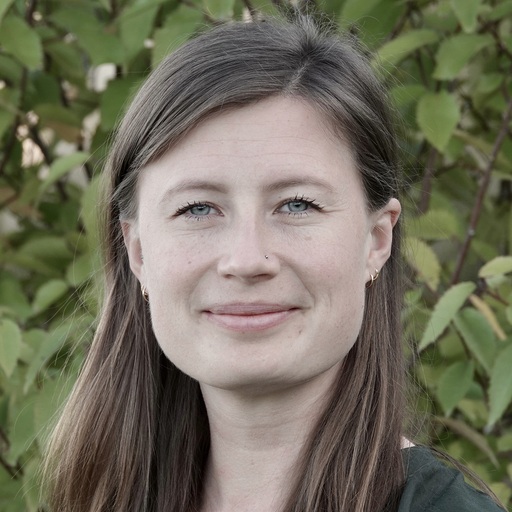"Co-design has a ‘co’ bit and a ‘design’ bit. Both bits are important but neither have all the answers."KA McKercher on the definition of co-design
On the 3rd of October, a group of 30 people from our Design and Community & Political Engagement teams had the privilege of coming together for co-design training with KA McKercher. This is the type of internal training and focus time we aim to prioritise for our Design teams, helping to to shape our professional practices, and the value we can bring to our client projects.
Many of us have been reading and listening to KA’s work for years, and as an international expert in co-design, we tried not to be starstruck. But KA instantly put us at ease, inviting us to ‘come as we are’ into the space, and replace our cleverness with curiosity as we dived into a day of exploring co-design.
We’re doing co-design with communities in our work already, and we’re committed to learning and growing so we do it well. The training with KA gave us space to think deeply and honestly about when we co-design, how we partner, and how we enable the conditions for co-design to be purposeful, well supported and create positive impact for people and communities. You can read about our approach in our recent blog post – Our approach to co-design
Here are some reflections on the day from our team.
Harriet Pugh – Design Lead
KA challenged us to think about our scope of practice and the topics we can work on. Each of us has a unique set of skills, cultural knowledge, relationships and experience that we bring, which qualifies us to work on things we understand well.
As design consultants, we might be experts in design, but we might not have the deep knowledge or expertise we need to explore sensitive topics and hold inclusive spaces that respect and build on existing work in certain areas.
If we want our work to be genuinely empowering we need to consider the skills, knowledge and relationships we hold, what role we can play and who we might need to partner with. We must have honest conversations about whether we are the right people to take on or lead work.
Nicole Aleong - Senior Design Researcher
When I was first invited to this session, I anticipated the focus of the workshop to centre around how we, as designers and researchers, could truly move “beyond sticky notes”. I came with curiosity and a willingness to ease away from so many of our so-called familiar tools. What I did not expect was the extent that KA encouraged us to reflect on our individual positionality and the role each of us play – and could play – in the co-design space.
As a warm-up activity, KA invited us to stand and self-organise in a line based on where we see our strengths and skills across four phases of co-design: the front of house, front stage, backstage and behind the scenes. KA invited us to acknowledge where our skills are now, then asked us to re-shuffle to the place where we’d like our roles to grow in the future.
This invitation drew me to reflect deeper on how co-design is not just a transformational learning experience for the community stakeholders we serve; it is also a retrospective and growth opportunity for all of us. To truly share power in co-design with communities and our clients, I come away rooted in the belief that we must acknowledge our own power and where we stand to use it.
Bryony Linden – Senior Design Researcher
Although it was incredible to learn from KA, my highlight was our own Harriet Pugh and Nina Wafula (Lead Service Designer) playing back their co-design projects.
It was great to hear about their approaches and learnings within the context of the co-design training – presented with clarity, authenticity and intelligent reflection.
The project playbacks sparked honest conversations around the challenges and opportunities of doing more co-design in our work, and raised the excitement in the room for the possibility of working on something similar.
Mathew Wilson – Lead Interaction Designer
I feel that I got a fuller understanding of exactly how collaborative and inclusive co-design really is. Realising that it’s far more than an evolution of user centred design. Possibly, even its own new branch and entirely new practice of design.
It’s far from a case of just working more closely with users, or running a few more collaborative workshops, or letting ‘inexperienced’ folk ideate with the ‘real designers’. Co-design aims to establish the audience as part of the end-to-end design process, and the designer a facilitator of the creative process.
Learning more about co-design has helped me realise that I need to keep revisiting and questioning my own practice, even with 20+ years of design experience. As a highlight then, I’d say realising that practice needs to be shaken up and revolutionised a bit!
Megha Wadhawan - Design Lead
A recurring theme for me throughout the day was KA’s initial statement that ‘Co-design is a felt experience’. Alongside their nuanced articulations around co-design boundaries, thoughtful facilitation and practical stories, the session felt like being immersed in the values of co-design – starting with designing with humility, care and creativity. What stood out for me, was this imbued learning along with the practical tips from the day.
A day-long workshop can feel demanding, yet all I felt at the end of the day was optimism, with a healthy dose of pragmatism, and a resolve to bring in practices and learnings from the day into our work.
Maia Tarling-Hunter – Design Lead
My highlight was how this session gave me time to think about my individual impact on co-design participants, and how the session challenged me to do better.
We talked a lot about working with experiences of trauma. When co-designing inclusive services and experiences, we can unintentionally trigger and re-traumatise people by involving them if we don’t adequately support them. This can also apply to design research and other spaces in the design process.
For some time, I’ve been interested in trauma-informed practice, but haven’t made any meaningful steps to upskill myself in it. I’ve since signed up for a training session on trauma-informed practice and restorative approaches as a first step.
If you’re interested in partnering with us or talking with us about co-design, please get in touch.
Our recent design blog posts
Transformation is for everyone. We love sharing our thoughts, approaches, learning and research all gained from the work we do.
-

Our time at Canoe Norway
Read blog post -

Transformation from the inside out
Read blog post -

The dimensions of fidelity in prototyping
Read blog post -

What we learned from running our Design Academy
Read blog post

